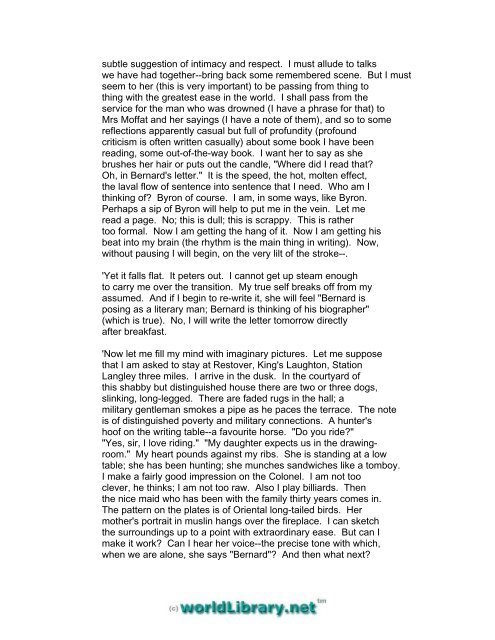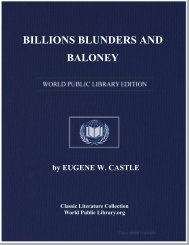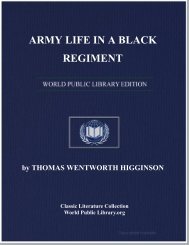THE WAVES (1931) - World eBook Library
THE WAVES (1931) - World eBook Library
THE WAVES (1931) - World eBook Library
Create successful ePaper yourself
Turn your PDF publications into a flip-book with our unique Google optimized e-Paper software.
subtle suggestion of intimacy and respect. I must allude to talks<br />
we have had together--bring back some remembered scene. But I must<br />
seem to her (this is very important) to be passing from thing to<br />
thing with the greatest ease in the world. I shall pass from the<br />
service for the man who was drowned (I have a phrase for that) to<br />
Mrs Moffat and her sayings (I have a note of them), and so to some<br />
reflections apparently casual but full of profundity (profound<br />
criticism is often written casually) about some book I have been<br />
reading, some out-of-the-way book. I want her to say as she<br />
brushes her hair or puts out the candle, "Where did I read that?<br />
Oh, in Bernard's letter." It is the speed, the hot, molten effect,<br />
the laval flow of sentence into sentence that I need. Who am I<br />
thinking of? Byron of course. I am, in some ways, like Byron.<br />
Perhaps a sip of Byron will help to put me in the vein. Let me<br />
read a page. No; this is dull; this is scrappy. This is rather<br />
too formal. Now I am getting the hang of it. Now I am getting his<br />
beat into my brain (the rhythm is the main thing in writing). Now,<br />
without pausing I will begin, on the very lilt of the stroke--.<br />
'Yet it falls flat. It peters out. I cannot get up steam enough<br />
to carry me over the transition. My true self breaks off from my<br />
assumed. And if I begin to re-write it, she will feel "Bernard is<br />
posing as a literary man; Bernard is thinking of his biographer"<br />
(which is true). No, I will write the letter tomorrow directly<br />
after breakfast.<br />
'Now let me fill my mind with imaginary pictures. Let me suppose<br />
that I am asked to stay at Restover, King's Laughton, Station<br />
Langley three miles. I arrive in the dusk. In the courtyard of<br />
this shabby but distinguished house there are two or three dogs,<br />
slinking, long-legged. There are faded rugs in the hall; a<br />
military gentleman smokes a pipe as he paces the terrace. The note<br />
is of distinguished poverty and military connections. A hunter's<br />
hoof on the writing table--a favourite horse. "Do you ride?"<br />
"Yes, sir, I love riding." "My daughter expects us in the drawing-<br />
room." My heart pounds against my ribs. She is standing at a low<br />
table; she has been hunting; she munches sandwiches like a tomboy.<br />
I make a fairly good impression on the Colonel. I am not too<br />
clever, he thinks; I am not too raw. Also I play billiards. Then<br />
the nice maid who has been with the family thirty years comes in.<br />
The pattern on the plates is of Oriental long-tailed birds. Her<br />
mother's portrait in muslin hangs over the fireplace. I can sketch<br />
the surroundings up to a point with extraordinary ease. But can I<br />
make it work? Can I hear her voice--the precise tone with which,<br />
when we are alone, she says "Bernard"? And then what next?

















